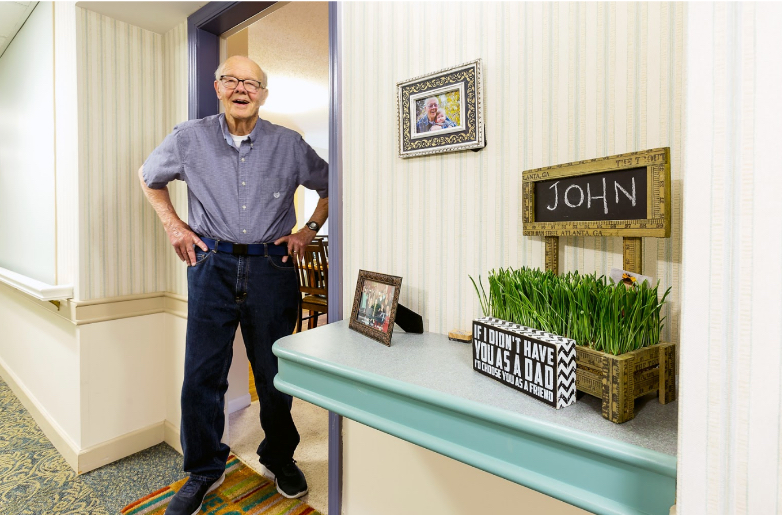Boutique Memory Care That Feels Like a Private Haven
Boutique Memory Care That Feels Like a Private Haven
Blog Article
Everything About Memory Care Providers: Why Little Memory Care Homes Are a Great Option
Memory care services play a vital duty in sustaining individuals with Alzheimer's and dementia. Tiny memory treatment homes stick out for their customized approach and intimate setup. With lower staff-to-resident ratios, these homes cultivate stronger connections and customized treatment. Citizens take advantage of enhanced social communications and a risk-free atmosphere. As family members check out options, recognizing the special benefits of little memory care homes becomes essential. What variables should be thought about when picking the right home?
Recognizing Memory Care Services
While several may know with basic elderly treatment choices, recognizing memory treatment services is essential for families encountering the difficulties of cognitive decline. Memory treatment specifically provides to individuals with conditions such as Alzheimer's condition and other types of dementia. These services offer a structured environment that concentrates on enhancing the lifestyle for residents with specialized care and support.Memory treatment facilities are made to ensure safety and security, typically including secured atmospheres to avoid roaming. Educated employee are offered all the time to aid with daily activities, medicine monitoring, and individual care. Furthermore, memory care programs usually include cognitive stimulation activities, customized to engage locals and promote mental well-being. Households can take advantage of understanding these solutions, as they allow notified decisions regarding their liked ones' care, ensuring that their details demands and preferences are dealt with in a caring and helpful way.
The Benefits of Little Memory Care Houses
Small memory treatment homes offer distinctive advantages that can significantly improve the lifestyle for residents with cognitive disabilities. One considerable advantage is the intimate atmosphere, which permits tailored communications amongst team and locals. This smaller sized setup promotes meaningful relationships, reducing feelings of isolation and anxiousness typically experienced by people with memory issues.Additionally, the lower staff-to-resident proportion in small memory care homes makes it possible for caregivers to provide even more mindful supervision and assistance. This method not just enhances safety and security but additionally promotes a complacency for the residents.Moreover, little memory treatment homes can adapt quickly to the distinct needs and preferences of each resident, permitting for an extra homey environment. Such an environment can motivate social engagement and involvement in tasks, ultimately enriching the everyday experiences of those living with cognitive impairments.
Personalized Treatment Program for Residents
Customized care strategies are vital in memory care homes, as they cater to the one-of-a-kind demands and choices of each citizen. These strategies start with comprehensive assessments performed by skilled specialists, that assess cognitive abilities, case history, and personal rate of interests. This customized technique guarantees that care is not just effective however additionally considerate of each individual's self-respect and autonomy.Moreover, individualized treatment plans are adaptable, permitting adjustments as residents' demands progress gradually. This adaptability fosters a sense of safety and security and experience, which is crucial for individuals living with memory challenges. Caregivers are educated to carry out these strategies continually, offering support that lines up with the residents' routines and preferences.Ultimately, individualized care strategies improve the top quality of life for locals by promoting self-reliance, health, and engagement, making them a fundamental element of memory care solutions in small memory treatment homes.
Producing a Home-Like Atmosphere
Creating a home-like setting is critical for promoting convenience and familiarity in memory care setups, as it significantly influences locals' psychological health. Little memory treatment homes frequently focus on tailored touches, such as warm color schemes, family photos, and familiar furnishings arrangements, which help residents really feel a lot more comfortable. Integrating aspects evocative a standard home, like comfy space and common areas, encourages a feeling of belonging.Moreover, utilizing natural light and outdoor areas can boost the ambience, promoting leisure and peace. Team member play a considerable duty in maintaining this atmosphere by engaging with citizens in a compassionate way, treating them like family members. Regular activities, such as food preparation or horticulture, can likewise contribute to a home-like feeling, using opportunities for homeowners to take part in meaningful experiences. Overall, developing a supporting atmosphere sustains cognitive feature and emotional stability, making it a vital aspect of memory treatment solutions.
Improved Social Communication and Neighborhood
Enhanced social communication and community are crucial parts of memory treatment services. By cultivating personalized social involvement and producing a family-like ambience, these services promote purposeful connections among residents. Group activities and events further urge participation, helping people really feel more consisted of and sustained.
Personalized Social Interaction
While social interaction is necessary for total well-being, several people with memory disabilities usually struggle to involve meaningfully with others. Personalized social interaction in memory care homes addresses this challenge by creating customized activities that deal with residents' unique passions and capacities. By focusing on private choices, caregivers can foster connections that reverberate deeply with each individual. Tasks such as art therapy, songs sessions, and assisted conversations promote cognitive stimulation and psychological expression. In addition, tiny team settings encourage sociability and permit even more intimate interactions, boosting feelings of belonging. This method not just deals visite site with feelings of seclusion yet additionally empowers locals to keep a sense of identity, eventually contributing to boosted mental wellness and lifestyle.
Family-like Environment
In a memory treatment setup, cultivating a family-like atmosphere substantially boosts social interaction and builds a sense of area among citizens. Smaller sized memory care homes usually prioritize intimate settings, permitting citizens to form closer connections with one an additional and team member. This nurturing atmosphere promotes count on, which is necessary for people with memory impairments. Residents are more probable to engage in conversations and share experiences, developing a supportive network that eases sensations of isolation. The familiarity of shared areas and regimens adds to a sense of belonging, better encouraging social communication (personalized memory care). In such settings, emotional bonds grow, leading to enhanced total well-being and a greater high quality of life for homeowners as they navigate their day-to-day experiences together
Team Activities and Events

Security and Safety Functions in Small Residences
Several little homes developed for memory care include crucial security and security features to guarantee the health of homeowners. These homes commonly make use of secure access and departure indicate protect against straying, an usual concern among individuals with memory impairments. Furthermore, security systems and alarm system systems enhance tracking, making sure that personnel can immediately react to any uncommon activities.Interior designs are tailored for safety, with minimized dangers such as clutter-free paths and sharp corners. Handrails and non-slip flooring are usually set up to lower the danger of falls. Team participants are educated in emergency procedures, guaranteeing they are gotten ready for numerous situations.Moreover, personalized care plans might include analysis of private security needs, supplying customized remedies for each citizen. Overall, these security and protection features develop a nurturing setting where locals can flourish while keeping their self-respect and independence.
Exactly how to Select the Right Memory Care Home
Just how can families assure they select the most ideal memory care home for their loved ones? The choice calls for cautious consideration of numerous variables. Households need to examine the center's personnel credentials and training, making certain that caregivers are experienced in taking care of memory-related problems. Next, it's important to examine the home's atmosphere, concentrating on safety attributes and whether it promotes a sense of area and belonging. Going to the center can give understanding into day-to-day tasks and the social ambience, which are important for mental stimulation and psychological well-being. In addition, households should ask concerning the treatment plans used, guaranteeing they are customized to private demands. Lastly, thinking about the home's place and ease of access for household check outs can add to a smoother shift. By dealing with these facets, households can make an informed decision that prioritizes their loved one's convenience and high quality of life in a memory care setup.
Frequently Asked Questions
What Certifications Should Staff Members in Memory Treatment Homes Have?
Team member in memory treatment homes must possess relevant accreditations, experience in dementia treatment, solid communication skills, and concern. Continuous training in behavioral administration and therapeutic interventions boosts their capability to support locals effectively.
How Do Memory Care Solutions Differ From Conventional Assisted Living?
Memory care services concentrate particularly on individuals with memory disabilities, giving specialized assistance and structured atmospheres. On the other hand, conventional assisted living provides basic aid with everyday tasks, lacking the tailored approach needed for those with cognitive challenges.
What Types of Activities Are Offered in Memory Care Homes?
Memory care homes typically provide a range of tasks designed to engage locals. Typical choices include art treatment, music sessions, cognitive video games, physical exercises, gardening, and social events, all intended at enhancing wellness and cognitive feature.
Can Locals Bring Their Own Possessions to Memory Care Homes?
Residents can generally bring their own valuables to memory treatment homes, enabling them to customize their living area - personalized memory care. This method aids create a familiar environment, promoting comfort and a sense of identification for the people

How Are Relative Entailed in the Treatment Process?
Household members play a necessary role in the care procedure, usually click to investigate joining decision-making, going to care conferences, and giving emotional support. Their participation cultivates a collaborative environment, improving the homeowner's overall wellness and lifestyle. While numerous may be acquainted with basic senior care alternatives, recognizing memory treatment solutions is necessary for families dealing with the challenges of cognitive decline. These solutions offer an organized environment that concentrates on improving the high quality of life for residents through specialized treatment and support.Memory care facilities are designed to guarantee safety and security, often including secured atmospheres to avoid wandering. Individualized treatment strategies are essential in memory care homes, as they cater to the special requirements and preferences of each resident. Staff participants in memory treatment homes must have pertinent qualifications, experience in dementia care, solid communication abilities, and empathy. Memory imp source treatment services focus specifically on people with memory impairments, supplying customized support and organized environments.
Report this page